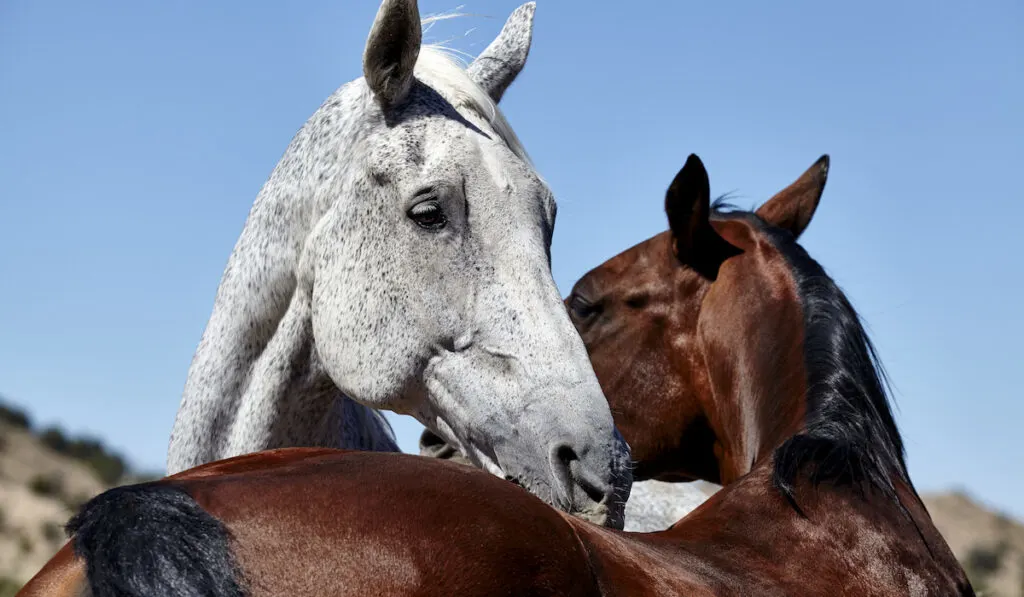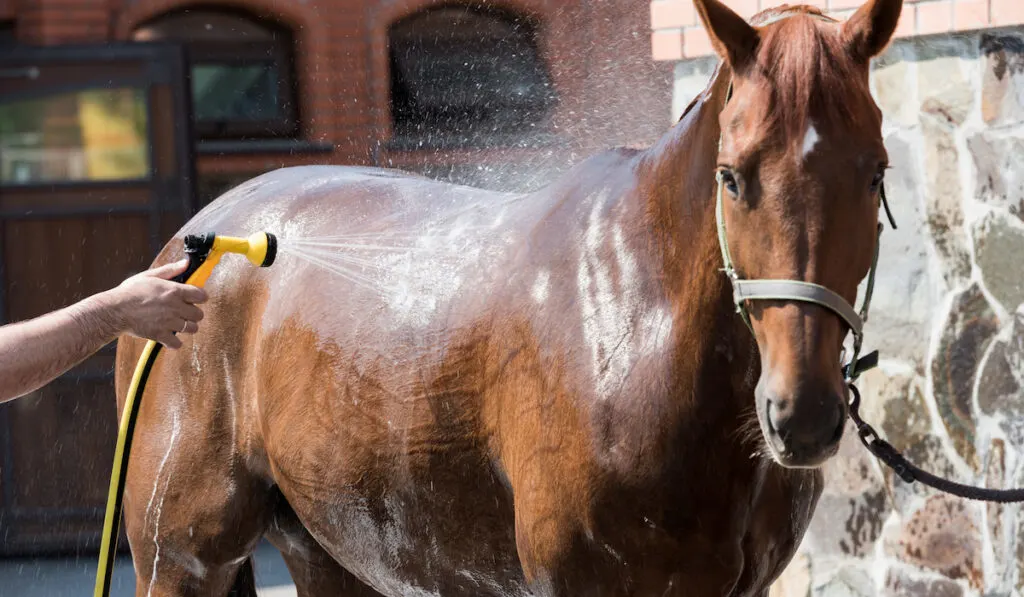It does not matter whether your horses have fleas, ticks or mites, you will be worried when you hear those names. What are fleas, ticks, and mites? How do they harm horses? Can they be prevented? Today, will we discuss these parasites.
Horses can get fleas, ticks, and mites. The symptoms of each parasite on your horse and the diseases they carry will be listed in this article. Now, it is time to know what are fleas, ticks, and mites.
Table of Contents
Fleas
Fleas are small wingless insects that reside on the body of mammals and birds. There are over 2500 species of fleas. They are 1.5-3.3 mm long (0.0625-0.125 in.).
Fleas get nutrition by sucking the blood of their hosts (this practice is known as hematophagy). Fleas have strong claws to anchor on their hosts and a special mouth for sucking the bleed of their hosts.

Fleas are host-specific. The host-specific nature of fleas implies that different species of fleas have their specific hosts on which they can reproduce (or grow).
Different mammals and birds have fleas that evolved to suck their blood. For example, cat fleas are different from dog fleas. The favorable host on which a species can reproduce is known as “Definitive host“.
Are There Horse Fleas?
Do horses have fleas? No. No kind of flea evolved to parasitize horses. Fleas, however, can accidentally parasitize horses. In this case, the horse is an “Accidental host”.
How Can Horses Get Fleas?
Here are different ways in which fleas can accidentally parasitize horses:
- The horse is not healthy
- The horse is not properly groomed
- Your horse entered an old flea-infested barn
- Cats and dogs with fleas entered the horse barn
- The coat of your horse rubbed grasses with flea on them, etc.
Symptoms of Fleas on Horses
Some symptoms of fleas on your horse are:
- Loss of hair
- Irritation of the skin
- Your horse scratches a region of its coat regularly
- Secondary infections can arise if the horse continues scratching
How to Get Rid of Fleas on Horses
You should consult your vet if you notice that your horses have fleas. A few methods of getting rid of fleas on horses are:
- The easiest method is to simply bathe the coat and mane of your horse with soapy water and rinse thoroughly. Follow up with a commercially available fly repellant and the fleas should be gone.
- Soak sliced lemon in boiled water overnight then brush your horse’s coat with the water.
- Dilute apple cider vinegar at a rate of 3:2 (3 cups apple cider vinegar to 2 cups water), add a teaspoon or two of sea salt, and spray on your horse’s coat.
If the fleas are still on your horse, contact your vet. Your horse may have some other biting parasite that isn’t truly a flea. Proper identification of the pest will ensure you are providing the right treatment.
Ticks
Unlike fleas, ticks are not insects. Ticks are arachnids just like spiders. Ticks are obligate parasites (meaning that they must feed on blood).
Ticks find their hosts by searching for them or staying at a particular point (a practice known as questing).
Unlike fleas, ticks do not live on their hosts, instead, they detach themselves when they are full.
Ticks are distributed world-wide especially in warm humid regions. In temperate regions, ticks are mostly seen in spring.
Unlike fleas, ticks do not have a high host specificity and can be parasites to different species of hosts. Ticks can be parasites to mammals, birds, reptiles, amphibians, etc. You do not want ticks near your horses because they transmit several diseases and can cause anemia.
Different species of ticks have a preferred feeding site on their hosts. Some species prefer the ears, pubic area, neck, head, or shoulders of their host.
Ticks can cause anemia (lack of blood) in many hosts (not so common in horses). Some tick-borne diseases that affect horses are Anaplasmosis and Lyme disease.
Ticks on Horses
Several species of ticks are found on horses. Examples of tick species found on horses are:
- The deer tick (Ixodes scapularis)
- Tropical horse tick (Dermacentor nitens)
- American dog tick (Dermacentor variabilis)
- Moose or winter tick (Dermacentor albipictus)
Several other species of ticks can be found on horses. A horse can serve as the definitive, or accidental host of ticks.
How Can Ticks Find Your Horses?
Different ways through which your horse can get ticks are:
- Pasturing near woodlands
- From cats and dogs with ticks
- Exposure in the wild for a long period
- Horses can get ticks from other infected horses
- During trail rides through brush
Several studies conducted on ticks discovered that ticks prefer the edge of woodlands, that is, where pastures meet forests.
Symptoms of Ticks on Horses
You can tell that your horse has ticks when you observe the following:
- You see the tick attached to your horse
- Lameness
- Swelling of joint
- Excess scratching
- Stiffness of muscles
- Skin irritation and hair-loss
Some species of ticks prefer joints in the limb of horses. When horses feel pain in their joints, they can become lame.
Removing Ticks from Horses
Removing ticks from horses is not very difficult. You can use tweezers to remove ticks from a horse. If you cannot find tweezers or you want to use your hands, follow the steps below:
- Wear gloves
- Grasp the spot of the skin where the head of the tick is buried
- Firmly pull the tick straight away from the skin of the horse until the head comes out
- Burn the tick or drop it on a small jar of rubbing alcohol to kill it. Do not squeeze the tick.
Ticks should not be killed by crushing or squeezing because they are extremely tough. No matter what, do not set it free. You should consider consulting a local vet for assistance.
Mites
Mites, like ticks, are arachnids. Mites are very tiny. Most mites are less than 1 mm (0.04 in) long. Not all mites are parasites; some live in soil as scavengers, others live on plants. We will be discussing the parasitic (or micro-predatory) mites.
Most parasitic mites live their entire lifecycle on the skin of their hosts. In horses, they pierce and burrow into the skin, and then suck the blood and other protein-rich substances. The reaction of the skin of horses to a mite infestation is known as “mange” (just like scabies).
How Can Horses Get Mites?
Horses can get mites from:
- Other mite-infested horses
- Straw or Hay with mites on it
- Other animals with mites on them
Mites mostly infect the legs or face of horses. Examples of mites found on horses are:
- Itchy leg mite (Chorioptes equi)
- Horse follicle mite (Demodex equi)
- Common mange mite (Sarcoptes scabiei)
- Scab mite or equine body mite (Psoroptes equi)
Symptoms of Mites on Horses
Some mite symptoms are:
- Itching
- Skin bumps
- Loss of hair and skin irritation
- Flakes on the face or spot of itching
How to Remove Mites from Your Horse
Most common equine insecticides will have some effect on mites. Look for a wipe-on or spray on fly spray labeled for ticks and mites.
You can also use commercially available dog shampoo designed to treat mange.
It would be used in just the same way as on your dog. Be sure to test a small area on your horse first to ensure there is no reaction but, in general, a dog-safe shampoo should be safe for your horse as well.
Tip: If you are given a soap or any chemical to wash the coat of the horse, thoroughly wash every part of the coat, not just the itchy region. There may be areas of the horse’s coat that have mange mites but haven’t started to itch yet.
How to Prevent Fleas, Ticks, and Mites
Prevention is the best medicine. Here are ways you can prevent these harmful parasites from infecting your horses:

- Do not reuse an abandoned barn without killing every pest from it.
- Raise birds: Chickens love to eat ticks and other little animals they find.
- Groom your horse regularly. If not daily, groom them several times weekly.
- Make sure that your horses are healthy and take them to the vet occasionally.
- Reduce how often you take your horses out when it is flea, tick, or mite season.
- Isolate horses with these micro-predators so that they do not infect other horses.
- Make sure that your cats, dogs, and other pets are free from fleas, ticks, and mites.
Final Thoughts
Fleas, ticks, and mites parasitize on horses and other animals. They feed on the blood of their hosts and cause skin irritation. They can be prevented when you keep your horses properly groomed and healthy.
Have you seen a flea, tick, or mite on your horse before? How did you feel?
Sources:
- https://en.wikipedia.org/wiki/Flea
- https://www.equus.co.uk/blogs/community/horse-mites-101
- https://en.wikipedia.org/wiki/Tick
- https://www.tsln.com/news/how-to-deal-with-ticks-on-horses-and-what-health-issues-to-watch-for/
- https://en.wikipedia.org/wiki/Mite
- https://horsesandfoals.com/do-horses-get-fleas/

